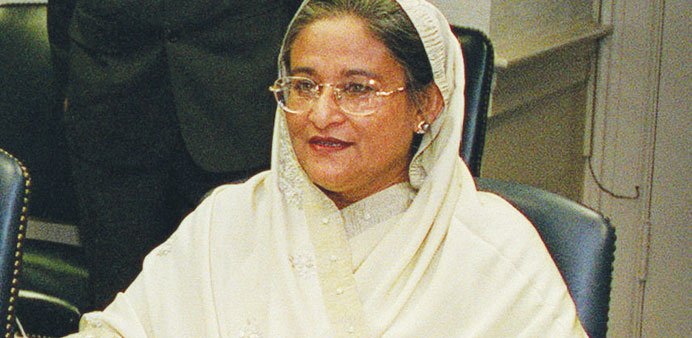By Mizan Rahman/Dhaka
Prime minister Sheikh Hasina yesterday affirmed that Bangladesh will become a middle-income country within the next three years before the targeted 2021 since the country has already stepped up a rung after becoming a lower middle-income country.
“We’ve already stepped into that stair as Bangladesh has been declared a lower middle-income country. I can assure you it won’t take 2021, before that time we would be able to establish ourselves as a middle-income country from a lower-middle income one. Perhaps it would take 2-3 years… I’ve that conviction,” she said.
She was addressing a function at her official residence Ganobhaban after opening the Cox’s Bazar International Airport construction project through videoconferencing.
Sheikh Hasina said barriers often come while accomplishing any task and her government had to overcome so many odds and obstacles.
She mentioned the BNP-led 20-party alliance could not slow down the pace of development despite carrying out countrywide arson attacks, vandalism and burning people to death.
She said Bangladesh has already been declared a lower middle-income country. “Bangladesh doesn’t want to stay at the lower ladder… it wants climb to the peak and we’ll do whatever is necessary for that.”
For further development of an independent and sovereign country like Bangladesh, Hasina said, all will have to work from their respective positions and fields with utmost sincerity.
Noting that Bangladesh is moving ahead on all fronts and continue to move, she renewed her vow to turn Bangladesh into a peaceful, stable country.
According to the World Bank, Bangladesh has become a lower middle-income country with the Gross National Income per capita (GNI), joining those with annual incomes of $1,046 to $4,125.
The World Bank in a posting on its website says it revises the income classification of the world’s economies every year on July 1 through calculation using the World Bank Atlas method.
Meanwhile, finance minister AMA Muhith said yesterday that the World Bank’s recognition of Bangladesh as LMIC (lower middle-income country) is an indication that the country is attaining the capacity to “stand on its own feet”.
“We have been in the LDC (least developed country) group for the past 40 years. Now we have got a promotion from that stage which can make us proud,” the minister told the media after a meeting with visiting Bhutanese finance minister Lyonpo Namgay Dorji at his secretariat office.
“It’s like standing on own feet. We are now doing many things on our own. In many cases, we don’t need help from others,” Muhith said when his reaction was sought.
He said the recognition from the World Bank is very important.
He said there is a process for graduating the eligible LDCs to LMIC which the United Nations will start soon. It will take another three years for giving a final judgement in this regard.
Muhith said despite this recognition, Bangladesh will continue to enjoy various facilities as LDC in global trade in three to four more years. “Bangladesh’s recognition as LMIC will depend on the decision of the UN Committee for Development Policy (CDP) whose judgement may not come before 2018/2019.”
The minister said presently Bangladesh gets only 1.8% of its gross domestic product (GDP) as global assistance. It was 8% of GDP during his last tenure as minister.
He said Bangladesh’s progress in social indicators was very good. “We are topping in whole sub-continent at this moment in social indicators as economist Amartya Sen has already said.”
“There are good reasons to be happy,” he added.
Muhith said he had a discussion with the Bhutanese minister about importing hydro-power from the Himalayan kingdom.
“During my recent visit, the King of Bhutan said they can provide us 1,000MW of electricity.”
He said the problem is transmission of electricity which we can do easily now. “We will build transmission line from Neal to India and Bangladesh via Bhutan. A very good environment prevails in this sub-continent now for development.”
Power can also be acquired from Nepal, Bhutan and India, the minister added.
Muhith said Bangladesh and Bhutan have great potential to increase trade. Presently, Bangladesh exports goods worth $2mn and imports goods worth $34mn. Bangladesh’s exports to Bhutan will increase due to newly established connectivity, he said.
The Bhutanese minister said Bhutan was the first country that recognised the independence of Bangladesh in 1971. Since then Bhutan and Bangladesh enjoyed excellent relationship. “We have renewed trade relation between Bangladesh and Bhutan.”
He said the sub-continent has been passing through transition period on the political front. “Therefore, it is important that the political leaders in the respective countries take political decisions that would benefit not only your country but also the entire sub-continent.”
Dorji said developing countries like Bhutan face various economic challenges. Appropriate policy directives are needed for a better tomorrow in this region.
“Our GDP is $1.7bn, very small. But we have free education and health system for all,” he added.
He said in many cases, Bhutan counts and takes policies based on gross national happiness. “We give more importance to happiness than economic development.”
Prime Minister Sheikh Hasina yesterday offered to undertake hydraulic projects with Bhutan on partnership basis to meet growing demand of electricity in the two countries and also in other countries of the region.
“These projects can be undertaken either as an investment partner of equity sharing or as direct purchaser of power,” she said in a meeting with Dorji at her Gonobhaban residence in Dhaka.

Sheikh Hasina
